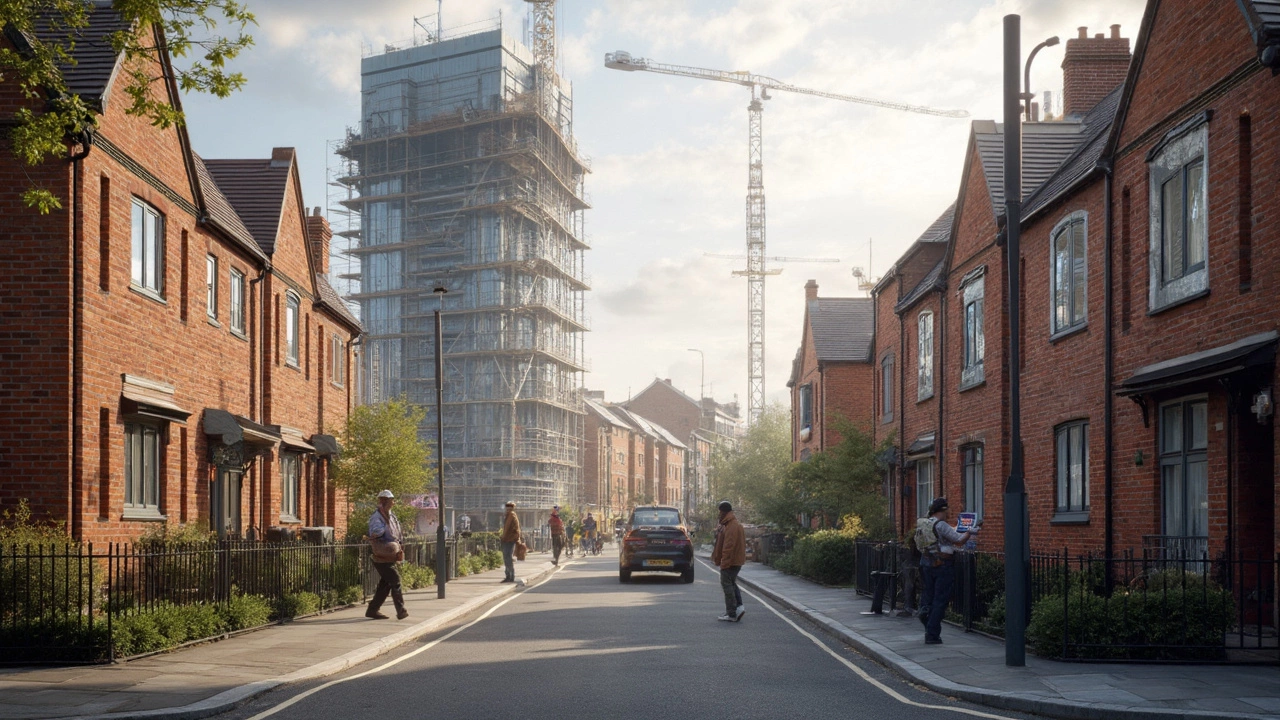Commercial or Residential Construction: Which Fits You Best?
 Jun, 19 2025
Jun, 19 2025
Ever wondered if building a strip mall is trickier than putting up a house, or if it pays off better? You’re not alone. There’s a lot of noise out there about commercial vs. residential construction, but most folks just want the straight facts—and maybe a tip or two to avoid rookie mistakes.
So, first thing’s first: these two worlds run on different rules. Residential projects usually mean single-family homes or apartment buildings. Commercial jobs cover everything from cafes to office towers. Each side has its unique challenges and payoffs.
If you’re thinking about where to put your time and money, you have to look past the glossy brochures. The budget isn’t just about upfront costs—it’s maintenance, tenants (or lack of), regulations, and red tape. No one enjoys a midnight call about a leaky roof, but a half-empty shopping center doesn’t pay the bills either.
Stick around, because we’re about to look at what really matters when you’re choosing your next move in construction.
- What Sets Commercial and Residential Apart?
- Money Talks: Costs, Risks, and Returns
- The Everyday Experience: Managing Each Type
- How to Pick What Works for You
What Sets Commercial and Residential Apart?
If you’re thinking all buildings are built the same way, think again. The gap between commercial construction and residential construction is bigger than most folks realize. It’s not just the size or whether you might buy your morning coffee there; we’re talking about different rules, costs, codes, and timelines.
Let’s get real. Commercial projects—think offices, malls, restaurants—have to meet stricter codes than houses or apartments. Fire safety, ADA rules (for accessibility), even parking requirements are more demanding on the commercial side. That’s before you even start thinking about stuff like elevators or sprinkler systems.
Materials and methods differ, too. Commercial jobs use steel, reinforced concrete, and special HVAC systems that homes just don’t need. Residential construction mostly sticks to wood framing, basic plumbing, and off-the-shelf appliances. That makes the work quicker but sometimes means more regular repairs down the road.
The crews are different. Commercial sites usually have a parade of specialists: steel workers, electricians, heavy machinery operators. On residential sites, you’ll see smaller teams and more generalists—your plumber might also install your washing machine connection and fix your neighbor’s leaky sink on the same day.
Timelines can be a shocker. A house or duplex can wrap up in six to twelve months, start to finish. An office building or small shopping center? You could be looking at 18 months, sometimes way longer if you’re dealing with city permits and inspections dragging their feet.
Here's a quick side-by-side so you can see what’s what:
| Factor | Commercial | Residential |
|---|---|---|
| Building Codes | Strict, more oversight | Standard, less complex |
| Materials | Steel, reinforced concrete | Wood, basic finishes |
| Contractors | Large teams, specialists | Small teams, generalists |
| Timeline | 12-24+ months | 6-12 months |
| Permits | Complicated, lengthy | Simpler, faster |
Here’s the kicker: Each type shapes what you’ll deal with after the build is done. Commercial spaces deal with more foot traffic, get regular inspections, and can be a bear to renovate. Homes are all about comfort and livability, so upgrades tend to be more about taste than fire exits or load-bearing walls.
Money Talks: Costs, Risks, and Returns
Money doesn’t just talk in construction—it shouts. People eyeing commercial construction usually face much bigger price tags than those looking at residential. Forget quick weekend renovations. Even a small commercial project, like a tiny cafe, can run well into six figures just for city approvals, electrical plans, and solid concrete. Apartments and houses? Still pricey, but less daunting unless you want a palace.
Let’s break it down:
| Type | Average Upfront Cost (per sq. ft.) | Loan Options | Typical ROI |
|---|---|---|---|
| Residential | $120 - $250 | 30-year fixed; FHA | 3% - 5% annual |
| Commercial | $200 - $600 | Commercial loan; short term | 6% - 12% annual |
Commercial properties usually win on returns. If you land a solid tenant—think a drugstore or bank branch—you can see solid cash flow every month. But there’s a flip side: it might sit empty for months if things go sideways. Residential rentals are easier to keep filled, maybe with tighter margins but steadier checks.
Now, let’s talk risks. Residential projects rarely get stuck because a plumber didn’t show up. In commercial work, if the ductwork is delayed, the entire project can grind to a standstill. Commercial builds depend on lots of subs, fancy tech approvals, and often, union labor. Any hiccup, and costs climb fast. One retail job I saw sat on hold for four months over a missing city inspection—total nightmare for the owners paying the loan but earning nothing.
Don’t forget surprise costs. Commercial insurance is pricier, and so is code compliance. The fire codes for a coffee shop can blow your mind compared to those for a four-bedroom home. Repairs for commercial HVAC or elevators? Add a zero compared to swapping out a home air conditioning unit.
- Plan for at least 10% more in overruns on either type, but budget even higher for commercial.
- Check the market. A residential slump usually lasts shorter than a commercial vacancy crisis.
- If you want steady, reliable returns and don’t mind dealing with tenants yourself, residential feels safer.
- For bigger rewards and higher risk tolerance, commercial is your playground.
Bottom line? Residential and commercial costs, returns, and hazards are on completely different scales. The right choice depends on how you feel about risk, how deep your pockets are, and how much patience you have when things blow past the budget.

The Everyday Experience: Managing Each Type
Managing a commercial construction project feels totally different from running things on a residential job. Picture this: with houses, you’re usually talking to families or maybe a small-time landlord. But once you step into the commercial game, you’re dealing with business owners, investors, or even corporate boards. It’s less about cozy kitchens, more about fire exits and loading docks.
First off, let’s talk schedules. Commercial sites come with tight deadlines and penalties for delays; you miss a mark, and you might pay for it—literally. Residential projects offer a little more wiggle room, but that doesn’t mean late completion goes unnoticed. In either world, one storm or a backordered shipment can throw off your plans.
- Commercial jobs tend to juggle more contractors and larger crews. There’s a bigger focus on safety meetings, paperwork, and inspections—think regular OSHA walkthroughs.
- Residential sites sometimes run with just a few trades working at once. Issues get solved on the fly, and there’s less red tape cluttering up the process.
Dealing with codes and permits is a biggie. Commercial projects face stricter building regulations—things like ADA compliance, fire sprinklers in every room, and more. Residential builds are no walk in the park, but inspectors often move faster when you’re just building a home or duplex.
Don’t forget maintenance and tenant management. Commercial properties may need everything from HVAC contracts to security systems and full-time janitors. Homeowners might call you to fix a dishwasher, but office units expect 24/7 service agreements.
| Aspect | Commercial | Residential |
|---|---|---|
| Average Permit Time (U.S.) | Up to 6 months | 1-3 months |
| Typical Team Size | 20-100+ | 5-20 |
| Once-a-week Inspections | Yes | Sometimes |
| Maintenance Contracts | Expected | DIY or As-needed |
Keeping track of costs matters too. On commercial projects, losing a day means big bucks lost; on a small home, it hurts mostly your reputation. Either way, know what you’re getting into before signing those contracts.
How to Pick What Works for You
Nailing down your direction comes down to how much risk you can handle, your timeline, and the kind of effort you want to put in. Let’s lay it all out so you can steer clear of buyer’s remorse.
Start with your goals. Are you after a steady income, or do you want room for a bigger (but riskier) payday? If you’re looking for something hands-off and lower maintenance, residential sounds good. If you want to scale up and handle larger projects—and you’re okay with more regulations and a longer wait for your return—commercial construction could be your lane.
- Commercial construction usually brings in higher rental income—think shopping centers, office buildings, or warehouses. But, vacancy periods tend to be longer, and you’ve got to handle stricter building codes.
- Residential construction often means faster project turnover and easier entry—there’s usually no shortage of people looking to rent or buy a home. The flipside: smaller cash flow and more tenant management.
Check out this real-world comparison:
| Type | Average Vacancy Rate (2024) | Estimated Annual Return | Regulation Complexity |
|---|---|---|---|
| Commercial | 10% | 6-12% | High |
| Residential | 4% | 5-8% | Medium |
Here's how to break it down step by step:
- Figure out your investment range. Commercial usually needs a bigger chunk of change up front.
- Ask yourself how much risk you can handle. If the idea of months without tenants stresses you out, that’s worth considering.
- Look at your network. Have connections in business real estate? That can open doors for commercial deals.
- Think about your local market. If demand’s hot for apartments or single-family homes, residential could mean faster results.
- Don’t forget about your bandwidth. Commercial projects often mean more paperwork, permits, and code inspections.
At the end of the day, don’t just follow what’s trending. Plug your info into an investment calculator, talk to folks who’ve done it before, and watch out for underestimating the time you’ll put into managing the property. Whether you lean residential for easier upkeep, or go full throttle with commercial for bigger bucks, make it a choice that fits your lifestyle—not just your wallet.
